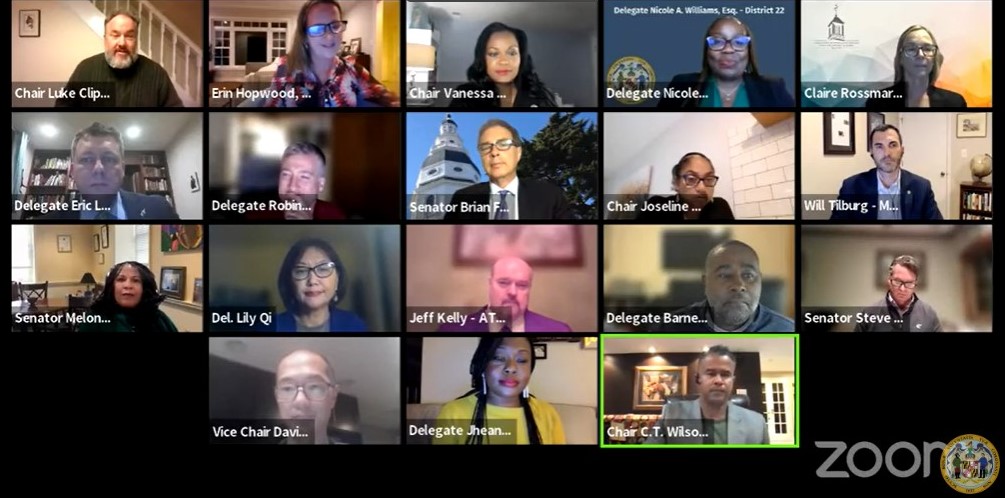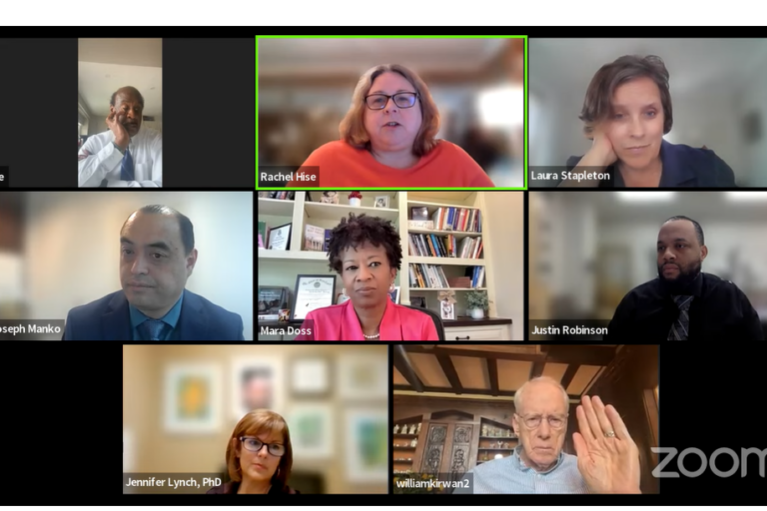While advocates continue to debate the ballot question, state bureaucrats prepare for legal cannabis

A Maryland House of Delegates committee established to ensure a smooth transition to legalized cannabis reviewed a report Tuesday on how the cannabis industry would be regulated by two state agencies.
The report serves as an update based on legislation approved this year for Maryland’s Medical Cannabis Commission to become part of the state’s Alcohol and Tobacco Commission. That wouldn’t happen unless voters next month approve the statewide ballot initiative known as Question 4 to allow recreational use of cannabis.
William Tilburg, executive director with the medical cannabis commission, said personnel from the cannabis commission would transfer to the alcohol commission.
A summary of the requirements includes minimizing the cost of the transfer, no diminution in pay, working conditions and benefits for the agency staffers, and allowing personnel to retain the merit system and retirement status they have on the date of transfer.
The cannabis commission has about 77 workers — approximately 46, or 60%, on contract or temporary status — in 16 offices, with the main office in Linthicum Heights in Anne Arundel County.
Because voters are expected to approve legalization of adult use of cannabis, Tilburg said it would be beneficial to hire people on a permanent basis.
“There needs to be merit positions in order to retain talent [and] attract new talent that you need with an expanded program,” he said.
The alcohol commission has 39 employees, which includes 22 law enforcement agents, 14 inspectors, investigators and support staff, two attorneys and one contractual position — a person who provides support on legislative, regulatory and administrative hearings.
Tilburg said employees can provide support for both agencies in areas such as communications and human resources. However, he said that comes with two conditions.
The first is that personnel outline only deals in managing medical cannabis because adult recreational use for those 21 and older hasn’t been approved yet by the voters.
The other stipulation is that currently, the cannabis commission receives support services in human resources, communications, procurement and information technology. The alcohol and tobacco commission receives assistance from the state comptroller’s office, because until a few years ago, its workers were part of the comptroller’s office.
Both agencies also get support from the state Department of Health.
“If those services are not continued, then…there would need to be additional staffing,” Tilburg said. “We have 160,000 medical [cannabis] patients in the state. This truly needs to be a seamless transition.”
Jeffrey Kelly, executive director of the alcohol and tobacco commission, said a possible plan would be to combine the units to enforce cannabis, alcohol and tobacco regulations.
But commission officials are reconsidering after recently chatting with officials from the state of Washington, which has two separate units to enforce regulations on alcohol, tobacco and cannabis. The legislature in that state approved both medical and recreational marijuana use.
“We were pretty sure we would be combining these at some point. We think now it’s just going to require some more review and consideration because there might be more to think about that our initial thoughts,” Kelly said. “The enforcement and the regulatory efforts in cannabis are dramatically different than those for alcohol and also for tobacco. The time amount, the expertise that’s required is much more detailed.”
The current budget for the cannabis commission stands at $9.5 million and the alcohol and tobacco commission is allocated $5.3 million.
Del. C.T. Wilson (D-Charles County) asked why more than half of the medical cannabis commission’s personnel are temporary and contractual workers.
Tilburg said his agency has asked for additional money, but it hasn’t been approved by the legislature.
Wilson praised the medical cannabis commission’s work, especially when it comes to the sophisticated testing of items such as heavy metals and pesticides. He asked why a separate state laboratory is necessary instead of utilizing current government labs.
Tilburg said the four labs would still be used, but that “having a state referenced laboratory is critical to compliance matters…and ensure the regulations are upheld.”
Wilson summarized the intent of the legislation approved this year.
“I don’t believe the goal for this legislation is to get Marylanders high. I believe it’s taking it out of the criminal stream of commerce,” he said. “My vision would be something where we tax it just as much as we need to enforce it.”
Support, opposition continues
One of Wilson’s Democratic legislative colleagues — Del. Stephanie Smith (D-Baltimore City) — appeared at a news conference and rally Thursday in her jurisdiction in support of Question 4. Among those joining her were former Baltimore Ravens player Eugene Moore, who chairs the Yes on 4 campaign that reported raising $106,220 between Aug. 24 and Oct. 9 and spending $112,555 during that period.
Those in attendance said recreational cannabis would create new jobs, save the state money from arresting people on marijuana possession charges, and provide millions of dollars in tax revenue.
“Marijuana sales would create tens of thousands of well-paying jobs.” Monroe said. “It would also open doors for hundreds of new small business owners and create opportunities for workers in other industries, including those in real estate, construction and manufacturing.”
Another rally to support legalizing cannabis will be held in Wilson’s jurisdiction Saturday.
Carlos Childs, one of the rally organizers, said in an interview Wednesday one of the goals is to educate residents in Southern Maryland about the benefits of legalization, such as the anticipated tax revenues and Blacks being a part of the cannabis industry. In addition, Childs said it helps having Wilson as a political ally who not only supports legalization, but also chairs the powerful House Economic Matters Committee, which oversees bills that focus on business regulations and financial institutions.
“If anyone should benefit from this, it should be the people who paved the way for legalization to happen,” he said. “We’ve been on the receiving end of the war on drugs. We’ve been on the receiving end of being locked up and discriminated for this, so we should definitely benefit from it.”
Not everyone shares such an optimistic view of cannabis legalization.
Christine Miller, a retired neuroscientist from Baltimore County, said Wednesday that daily cannabis use increases the chances of a person getting onset schizophrenia. She said it can start in adult males at age 21 and for women at age 25.
Miller, who has analyzed and studied the causes of psychosis since she began her practice in 1989, participated in a few mini- rallies in parts of the state to protest legalization. She said medical cannabis businesses should be required to place warning labels on products that using cannabis can cause psychosis, suicidal behavior and even strokes.
She highlighted a 2002 study that the annual cost to house and treat those with schizophrenia was estimated at nearly $63 billion. Today’s estimated costs, which she based on an inflation calculator from the U.S. Bureau of Labor Statistics, would be $99.5 billion.
“It’s expensive for society at large. We all pay,” Miller said. “It’s unfair to the voting public to put such a technical question on the ballot. It’s a topic that I wish our Maryland officials from the governor’s office to the health department had done more to educate the public in advance of this vote.”
Capital News Service reporter Timothy E. Dashiell contributed to this report.




 Creative Commons Attribution
Creative Commons Attribution